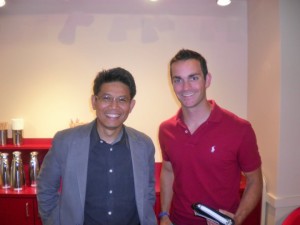What Trung Le Taught Me About Education
So, the first installment of this series on “What _________ Taught me about Education” features Trung Le. In case you’re unfamiliar with this series, check out this article right here. It’ll explain everything. Anywho…Trung Le. Never heard of him? Well, you should have. Let me break it down for you:

- He was a speaker at TEDxNYED – https://www.youtube.com/watch?v=AEb2nZWvtGE
- Fast Company Contributor for Education and Design
- Former principal education designer at Cannon Design based in Chicago, IL
- Helped lead an interdisciplinary group of designers and educators from the U.S., U.K., Canada, and Germany, to collaborate on a research project that resulted in the publication The Third Teacher: 79 Ways You Can Use Design to Transform Teaching & Learning. (Also featured in our Top Teacher Reads List)
- Internationally-recognized authority on design thinking and education
SO, needless to say, he’s got his resume maxed out and I had the privilege of meeting with him (and grabbing some delicious coffee). What knowledge did I gain from this incredible experience? Here’s my top 5 Takeaways:
TOP 5 TAKEAWAYS FROM TRUNG LE
1. We need to minimize (or just completely remove) hallways
Did you know that hallways take up about 30% of a building’s interior space? That’s nearly a third of the entire is dedicated to simply transporting students from one room to another. Why do we do that? Why can’t the hallways be a part of the learning process or have classroom be connected?
2. We need to teach students how to think in respect to disciplines
In the education world of today, we hear a lot of talk about “thinking critically” and “divergent thinking.” But what about “thinking mathematically” or “thinking scientifically” or “thinking artistically?” Le posits that one reason students are struggling so much when they enter the work force is that they were trained in the hard skills but not in the mindset. Students need to know not only how to work like an engineer but also how to think like one.
3. We need to recognize that a classroom is a part of the curriculum
If you notice most classroom, they are all relatively the same size with the same setup and even the same color. If you were to look at the effects of standardization on school and academics, you would immediately see that there must be a better way. Numerous studies have been done that show that colors affect academics and even the ceiling height affects a student’s mindset. That’s not mention the positive effects of windows and natural sunlight. The classroom is not just a room to hold students for 50+ minutes and keep them from wandering. It’s just as much a part of the curriculum as the textbooks, the visual aids, and even the teacher.
4. We need to teach students to construct problems, as well as solve them
A big problem in today’s world (especially in mathematics) is that students know all the formulas and all the rules, but not when to apply them in real-life settings. What’s even worse is that we have computers and programs to help with many of these tasks (which is what the professionals do) but students are still learning how to do them by hand. You don’t teach somebody to use a hatchet and then hand them a chainsaw. While they would inherently understand the value of this tool, I can tell you that I can appreciate a chainsaw without any formal hatchet training. Schools need to recognize this mentality and focus on teaching students on how to ask the right questions, not just answer them.
5. We need to have flexible learning environments
We live in a dynamic world. With the exponential growth of technology, automated living, and speed of life, there is no telling what the world will look like at the end of this year (much less 12 years from now). Students need to be agile in the work place and, by making the classroom an agile environment, we can teach them that. While Monday maybe a lecture day, the classroom should be able to adapt swiftly for projects, group activities, and assessments.
Did you find this article interesting? Share with your friends!
Stay Smart, Dominick Cooper Founder of Launch Academy Tutoring Company and 2013 Nominee for Young Entrepreneur of the Year in Tulsa





